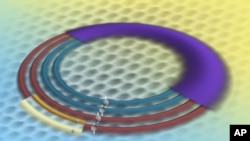The Nobel Prize for Physics has been awarded to two British-based scientists for their discovery of a new material that is only an atom thick and which could change the future of electronics.
Russian-born Andre Geim and Konstantin Novoselov, both from Manchester University in Britain, won the prize for their groundbreaking experiments with graphene, a microscopic flake of carbon.
The pair first extracted the super-thin flake from a piece of graphite, the same material found in ordinary pencils.
One millimeter of graphite actually consists of 3 million layers of graphene stacked on top of each other.
The bonds between the carbon atoms of graphene are the strongest in nature. It not only promises to revolutionize semiconductor, sensor, and display technology, but could also lead to breakthroughs in quantum physics research.
And, scientists believe it could one day be used to make transparent conducting materials, biomedical sensors and even extremely light, yet strong, aircraft of the future.
Professor Per Delsing, a member of the prize-awarding Royal Swedish Academy of Sciences, describes the strength of the material.
"If we make a hammock out of graphene which is one square meter, even though it's just one atom thick you can actually place a cat weighing about four kilos in that net. The hammock would weigh only one milligram, the same as one of the cat's whiskers," noted Professor Delsing.
Professor Olga Botner, a physicist at Sweden's Uppsala University and a member of the Academy of Sciences, says prototype manufacturing is already under way in laboratories.
"Very recently, people have succeeded in making 70-centimeter-wide membranes of graphene, and this is what you need for applications like TV screens, light panels and solar cells," explained Professor Botner. "You need large, thin screens of this material, which is almost completely transparent. It lets through 98 percent of light, but not molecules, not even helium, which is the molecule that normally passes through any membrane."
Andre Geim and Konstantin Novoselov will be invited to Stockholm in December to receive their Nobel medallions and diplomas from Sweden's King Carl XVI Gustaf. The Nobel Prize for Chemistry will be announced Wednesday, followed by the Literature Prize on Thursday and the Nobel Peace Prize on Friday. The Alfred Nobel Memorial Prize for Economics will be announced Monday, October 11.




